In 4th day of demonstrations over crumbling economy, protesters call for ‘the fall of the regime’; Druze party leader threatens to quit cabinet if reforms not enacted
By AGENCIES20 October 2019, 6:06 pm 0
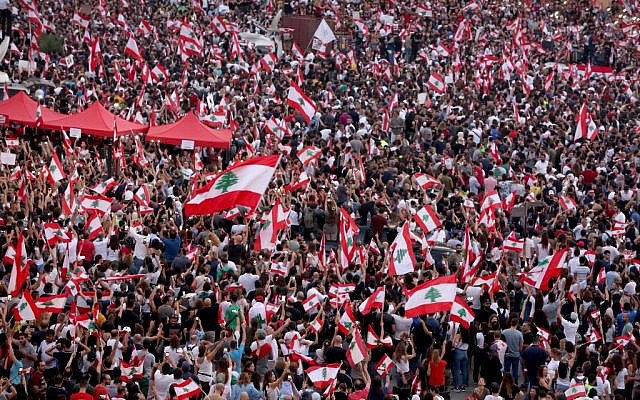
Lebanese demonstrators wave national flags as they take part in a rally in the capital Beirut’s downtown district on October 20, 2019. (Patrick Baz/AFP)
BEIRUT — Hundreds of thousands of Lebanese took to the streets to condemn political stasis and corruption Sunday, the largest in four days of demonstrations that have crippled the country and threatened the coalition government.
The capital Beirut, second city Tripoli in the north and the southern port of Tyre came to a standstill, with streets filled with protesters waving the national flag, chanting “revolution” or “the people demand the fall of the regime” — a common refrain of demonstrations in other parts of the Arab world.
The protests, Lebanon’s largest in five years, have grown steadily across the Mediterranean country since public anger first spilled onto the streets Thursday evening in response to a proposed tax on calls via WhatsApp and other messaging services.
While the government quickly dropped the plan, the leaderless protests morphed into demands for a sweeping overhaul of the political system, with grievances ranging from austerity measures to poor infrastructure.
“People cannot take it anymore,” said Nader Fares, a protester in central Beirut who said he’s unemployed. “There are no good schools, no electricity and no water.”
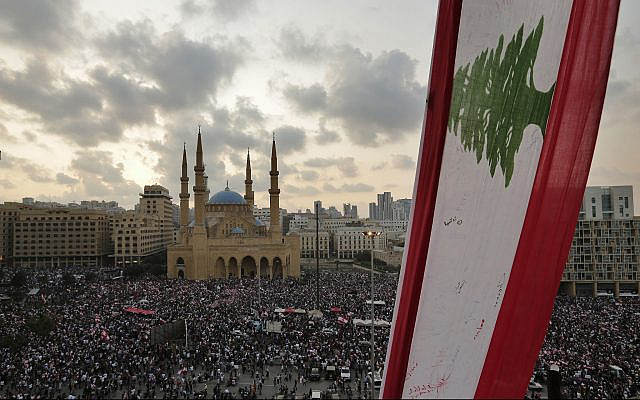
More than a quarter of Lebanon’s population lives below the poverty line, the World Bank says, while the political class has remained relatively unchanged since the end of a devastating 15-year civil war in 1990.
In Beirut, protesters on Sunday called out the names of specific politicians from across the country’s sectarian system, with the crowd responding with swear words.
Beleaguered Prime Minister Saad Hariri has urged government members from different blocs to support him but four ministers from a Christian political party quit Saturday.
On Sunday, the Progressive Socialist Party of Druze leader Walid Joumblatt said his two Cabinet ministers would only stay in the government if it enacts reforms. Those include no new taxes and no deductions from retirement salaries, plus an end to overspending.
One of Joumblatt’s ministers, Wael Abu Faour, said they are against the government resigning because a political vacuum could lead to financial collapse.
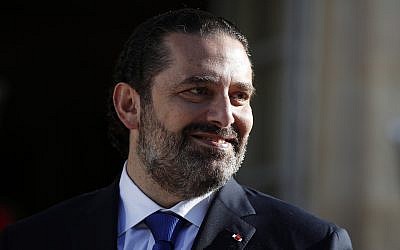
Lebanese sources told Reuters that Hariri reached an agreement with his governing partners on a reform package which was expected to be approved by the cabinet on Monday.
Among other measures, the reforms include a 50 percent cut to salaries of current and former officials; a $3.3 billion infusion from banks to achieve a “near zero deficit” in next year’s budget; plans to privatize the telecommunications sector and reform the energy industry; as well as the establishment of new regulatory and transparency bodies.
The sources said the next budget would not have any new taxes.
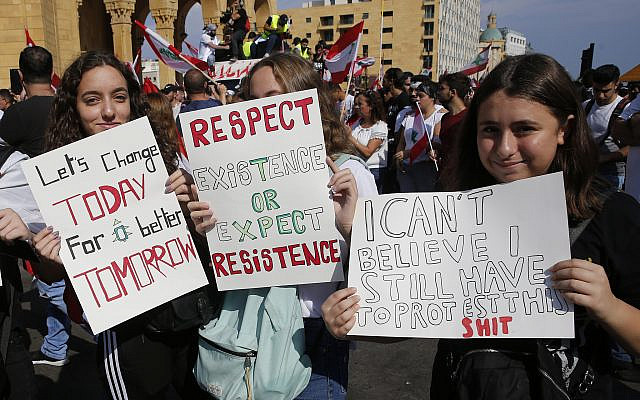
In Tripoli, Nazih Siraj, 50, said he lost his job after the government removed stalls from the roads.
“I can’t afford to rent out a place because of the high prices and unfair taxes,” he told AFP, saying he was demonstrating for the future of his four daughters.
“Its time for a change. There is no going back from the streets after today.”
Lebanon ranked 138 out of 180 in Transparency International’s 2018 corruption index, while citizens suffer chronic electricity and water shortages.
Deadline under fire
Lebanon’s political system was set up to balance power between the country’s religious sects, including Christians, Sunni Muslims, Shiite Muslims and Druze.
But critics say it entrenches political patronage and pits citizens against each other along sectarian lines.
What some have dubbed the “WhatsApp revolution” has support from wide swathes of Lebanese society.
The protests have been mostly good-natured, with people singing or launching into traditional dabke dances, while others play cards and smoke shisha.
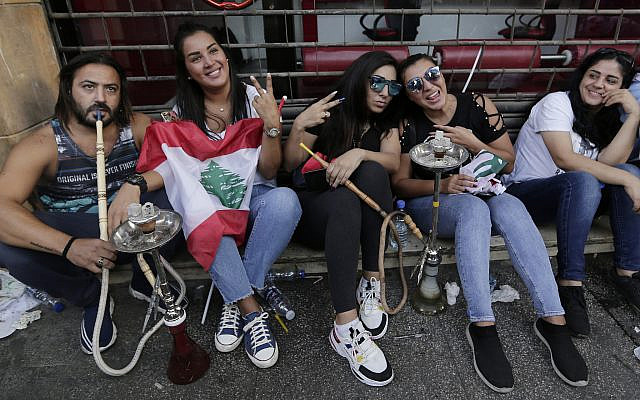
But while the demonstrators are largely united on what they oppose — with many condemning the entire political class as thieves and criminals — they lack a clear set of demands.
On Friday Hariri did not say what would happen if the government did not back key reforms by Monday night, with the 72-hour deadline widely mocked among protestors and on social media.
Scuppering Hariri’s unity call, Samir Geagea, head of the Christian Lebanese Forces party announced late Saturday that his four ministers were quitting the government.
“We are now convinced that the government is unable to take the necessary steps to save the situation,” Geagea said.
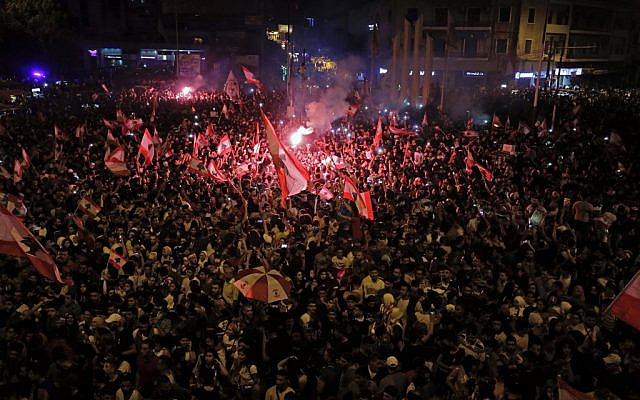
Other members of the government, including Shiite terror group Hezbollah and the Christian Free Patriotic Movement, oppose the government’s resignation.
‘Thieves’
Demonstrators hailed Geagea’s announcement but demanded more wholesale change.
Zalfa Aboukais, 27, was hanging signs bearing the names of lawmakers and ministers on barbed wire near parliament and the seat of government, saying they were all “thieves.”
She said she was protesting “against the hooligans who have been in power for 30 years.”
Another protester, Dani Mourtada, said the country was waking up to reject entrenched sectarianism.
“We no longer want people to beg for legitimate rights and services that the state is supposed to provide,” Mourtada, 26, said.
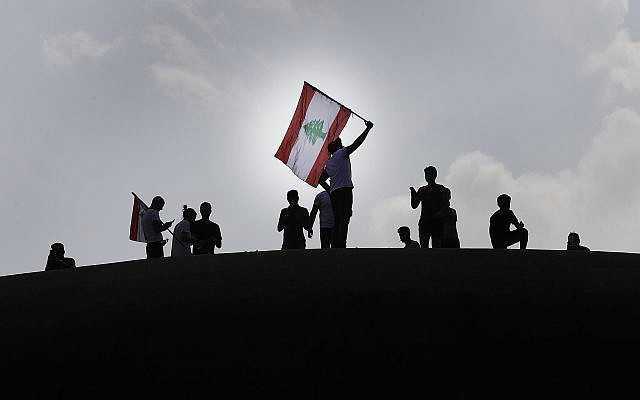
Sanaa Mallah, 40, said she was protesting to bring down the government.
“I have a lot of hope in this movement.”
Lebanon is one of the world’s most indebted countries, with a deficit of around $86 billion — more than 150 percent of gross domestic product — according to the finance ministry.
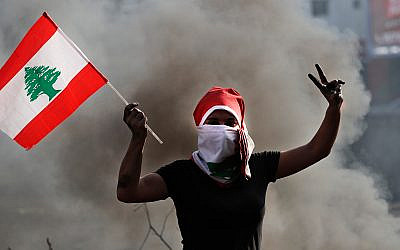
Public anger surged after parliament passed an austerity budget in July as part of efforts to make reforms that are essential if Lebanon is to unlock over $11 billion in economic assistance pledged by international donors last year.
Growth has plummeted in recent years, with political deadlock compounded by the impact of eight years of war in neighboring Syria.
Home to around 4.5 million people, Lebanon says it is hosting some 1.5 million Syrians who fled the conflict with many politicians blaming the refugees for the country’s woes.
Times of Israel staff contributed to this report.



Leave a Reply
You must be logged in to post a comment.